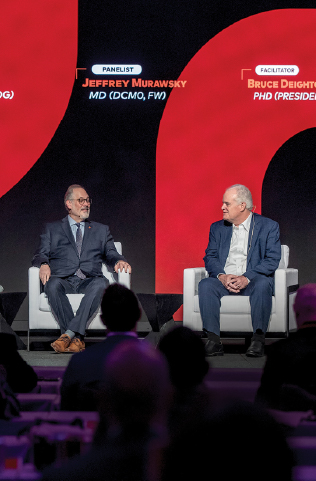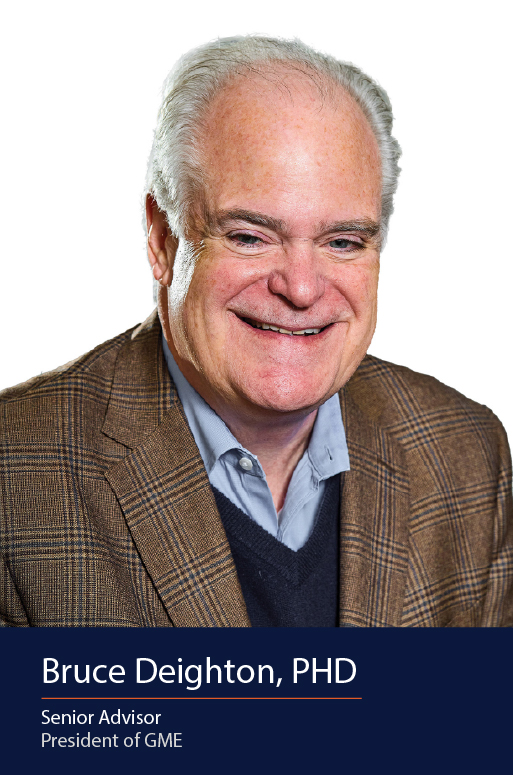The Graduate Medical Education program plays an integral role in training and retaining exceptional physicians.


The future of healthcare depends on well-qualified, compassionate providers at every level. To that end, HCA Healthcare is playing an integral role in educating and preparing the next generation of physicians. A little more than 10 years ago, the Graduate Medical Education (GME) program was launched to train HCA Healthcare’s residents.
“The U.S. healthcare workforce is undersupplied, and part of the reason comes from a bottleneck in the residency programs,” says Greg Guldner, MD, vice president of Academic Affairs, HCA Healthcare. “Medical schools have increased the number of students, but without a place [for them] to complete their residencies, we won’t be producing physicians.
“HCA Healthcare decided we needed to be part of the solution to improve the outlook for healthcare as a whole.”
HCA Healthcare’s GME program has grown exponentially over the past decade and now serves more than 5,000 residents in 72 hospitals. Educating this large group of young professionals not only helps ensure the future of healthcare in the United States, but it also benefits the HCA Healthcare system and the communities we serve.

Far-reaching benefits of the GME program
From a medical staff standpoint , creating a GME program at HCA Healthcare helps provide a talented, well-trained supply of physicians to fill open roles at hospitals and facilities throughout the system. While not everyone who goes through the HCA Healthcare GME program will remain, more than 30% of graduates do.
“It’s a real benefit when physicians trained within our system stay on staff,” says Bruce Deighton, PhD president, GME. “Those physicians come ready to practice on day one with a full understanding of our systems, clinical protocols, and medical and nursing staff .” The residency program also benefits people in the communities we serve by improving the level of care in many ways, including the following:
• Increased safety. At our teaching hospitals, patients receive care from a team of faculty physicians, residents and clinical fellows.
• Improvements in best practices. Residents bring a fresh way of looking at things, and their new ideas can shine a light on policies and procedures and help change things for the better.
It’s a real benefit when physicians trained within our system stay on staff.— Bruce Deighton, PhD president, GME
Leveraging scale
HCA Healthcare has worked hard to cultivate a residency program that is highly regarded for its research initiatives, learning environment and respect for the residents. For many physicians graduating from medical school, entering HCA Healthcare’s GME program proves advantageous for a number of reasons.
One of the most obvious advantages is the scale of HCA Healthcare’s system. Leveraging the number of hospitals and facilities within the system provides residents with access to more clinical experience, resources, and support services than can be found in other programs limited to one location. The vast network of clinical and specialty programs provides a great learning environment for those embarking on careers in the medical field.
Geography also plays a role in attracting residents to HCA Healthcare’s GME program. Research has shown that many residents pursue their careers in the communities where they trained. With GME programs in hospitals across the country, residents have some ability to choose a location that appeals to them, whether that’s close to family or in a climate they prefer. And if they do choose to move to a new location after residency, the opportunity to stay within the HCA Healthcare system remains.
Prioritizing well-being
In addition to talented faculty and high-quality research programs, the well-being of each resident is highly valued. HCA Healthcare’s program uses a well-researched, positive psychology program to enhance the wellbeing initiatives of the GME program.
It started at Riverside Community Hospital in Riverside, California, where Dr. Guldner served as the director of the emergency medicine residency program. His own interest in and study of clinical psychology led him to partner with Claremont Graduate University in Claremont, California, to compose a plan to help build a workplace experience where residents could flourish. It consisted of a foundation built around two major theories: Job Demands-Resources (JD-R) and Self-Determination Theory (SDT). The program at Riverside was so successful that it has since been applied to all of HCA Healthcare’s residency programs.
Put simply, JD-R says workplace burnout occurs when demands become greater than your resources.
“What we found was that, in taking care of some challenges in the workplace that have a high feasibility of being repaired, we saw a positive impact on our residents,” Dr. Guldner says. “They felt they were being listened to and that their actions mattered.”
From building autonomy into the residency program to training our faculty [in ways] to communicate better with residents, the idea is that you care about me; we care about you; and we have shared goals.— Greg Guldner, MD, vice president of Academic Affairs, HCA Healthcare
One resident mentioned their computer’s battery continued to lose charge during rounding, so their director jumped on a solution. With new computer batteries, residents can now complete their rounds focused on patients without needing to recharge.
The other approach applied at Riverside, SDT, focuses on the degree to which three basic needs — autonomy, belonging and competence — are met. Research shows that the perception of meaningful work is one of the biggest drivers of well-being and one of the strongest predictors of resident engagement.
“As we apply the practices from Riverside throughout the GME program, we are being very deliberate in finding ways to amplify meaning and drive this throughout our programs,” Dr. Guldner says. “From building autonomy into the residency program to training our faculty [in ways] to communicate better with residents, the idea is that you care about me; we care about you; and we have shared goals.”
The results speak for themselves. At Riverside, which was the first to implement these strategies, residents rated the program with high marks on internal assessments, and the program won the American College of Emergency Medicine Physicians Wellness Center of Excellence Award in 2022.

GME leadership transition
In March, the HCA Healthcare GME program introduced new leadership to help drive the program to further success. Dr. Butler comes to Nashville, Tennessee, from HCA Healthcare’s North Florida Division, where she was division chief medical officer. She brings a strong reputation for energetic, outcome-driven operational leadership and clinical expertise to this new role.
Deighton, who has been with the program since its inception, plans to retire at the end of 2024. To ease that transition, he will stay on as a senior advisor while Dr. Butler serves as president of GME.


